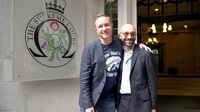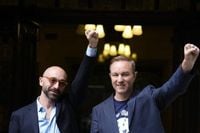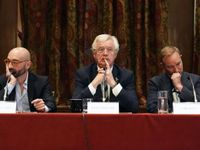On Wednesday, July 23, 2025, Britain’s Supreme Court delivered a landmark ruling that quashed the convictions of two former financial market traders, Tom Hayes and Carlo Palombo, who had been found guilty of manipulating benchmark interest rates in one of the most significant scandals to emerge from the 2008 global financial crisis.
Tom Hayes, once a trader at Citigroup and UBS, was convicted in 2015 of multiple counts of conspiracy to defraud for his role in manipulating the London Inter-Bank Offered Rate (Libor) between 2006 and 2010. Carlo Palombo, former vice president of euro rates at Barclays, was found guilty in 2019 of conspiring to submit false or misleading submissions for the Euro Interbank Offered Rate (Euribor) between 2005 and 2009. Both men served prison sentences—Hayes for over five years and Palombo for a shorter term—and were released in 2021.
The Supreme Court’s unanimous panel of five justices, including Lord Leggatt who authored the detailed 82-page judgment, ruled that the trials of Hayes and Palombo had been fundamentally unfair. The judges found that the trial judges had given legally inaccurate and misleading instructions to juries, effectively directing them to conclude that the traders’ behavior was dishonest without allowing them to independently assess this critical question. Lord Leggatt emphasized, “That misdirection undermined the fairness of the trial.”
Hayes was initially sentenced to 14 years in prison, later reduced to 11 years on appeal, while Palombo received a four-year sentence. The misdirection in jury instructions deprived Hayes of a fair chance to present his defense and for the jury to consider whether he had acted dishonestly. Similarly, flaws in the directions given at Palombo’s trial meant his conviction could not safely stand. The Supreme Court concluded that both convictions were unsafe and must be quashed.
Speaking outside the Supreme Court, Hayes described the ruling as surreal, saying, “It feels very surreal, a bit like my conviction, like it’s not really happening to me. I’m just very grateful to all the justices who heard the appeal, very grateful to all the people who have supported me, strangers and friends alike.” He expressed that his faith in the criminal justice system, which had been shaken during his ordeal, was now restored. Hayes also revealed the personal toll of the conviction and imprisonment: “I came out [of prison] to a son who was nine years old who I left when he was three. My marriage broke down whilst I was in prison. My mental health broke down while I was in prison.”
Palombo, who spent much of his prison time in a small shared cell at Wandsworth Prison, spoke of feeling like a scapegoat in a broader purge by banks and regulators aiming to deflect blame for the financial crash. He said, “The stuff of which I was accused and convicted was something that was done completely openly by absolutely every single person… it was just a normal business practice of the bank.” Palombo described the justice system he faced as “Kafkaesque” and looked forward to “not just being seen as the monster.”
Conservative MP Sir David Davis, a vocal supporter of the two men throughout their legal battles, called the case a “major scandal” and urged urgent reforms to the UK judicial system. Speaking at a press conference, he described Hayes and Palombo as “scapegoats for the sins that led to the financial crisis” and highlighted the devastating impact on many individuals caught up in the scandal. Davis alleged collusion between banks and government agencies, including the Serious Fraud Office (SFO) and the Financial Conduct Authority (FCA), that led to this scapegoating. He stressed the need for reform “on a range of issues – the handling of expert witnesses right through to the rigidity of the appeals system.”
Lord Leggatt’s judgment also raised concerns about the effectiveness of the criminal appeal system in England and Wales in addressing legal errors, noting that the history of these cases exposed systemic weaknesses. Sir David Davis echoed these concerns, stating, “I think the judicial system needs a shake-up, and this is the latest demonstrator of it.”
The legal battle hinged on the interpretation of the rules governing Libor and Euribor submissions. These benchmark interest rates were set daily based on figures submitted by panels of leading banks, reflecting the rates at which they could borrow from other institutions. During the financial crisis, the benchmarks became vulnerable to manipulation, as banks sometimes submitted artificially low rates to appear more creditworthy, and traders sought to influence these submissions for profit. The critical legal question was whether traders were obliged to select the cheapest borrowing rate or if they could choose a different rate that might benefit their institutions commercially.
In Hayes’ trial, the judge directed the jury that choosing a rate for commercial advantage was dishonest, a direction that Hayes and his defense team argued was legally incorrect and prejudicial. Lord Leggatt ruled that such legal questions should have been left to the jury’s assessment rather than dictated by the judge. The Supreme Court found that the jury was deprived of the opportunity to fairly consider Hayes’ defense, rendering the trial unfair.
The Serious Fraud Office, which began investigating Libor and Euribor manipulation in 2012 and prosecuted 20 individuals between 2013 and 2019, expressed that it would not seek retrials for Hayes and Palombo. The SFO’s investigation had led to nine convictions of senior bankers, but the office acknowledged that the legal directions given to juries in Hayes’ and Palombo’s trials were incorrect, making those convictions unsafe. It stated, “We have considered this judgment and the full circumstances carefully and determined it would not be in the public interest for us to seek a retrial.”
Hayes and Palombo’s case follows the 2022 decision by the U.S. Second Circuit Court of Appeal, which overturned similar convictions of two traders in the United States. This ruling paved the way for the UK Supreme Court to reconsider the appeals of Hayes and Palombo, who had previously been denied relief by lower British courts.
Supporters of Hayes and Palombo believe this decision may open the door for others convicted in similar circumstances to seek justice. Ben Rose, part of Palombo’s legal team, remarked that the Supreme Court’s judgment “is likely to offer a route” for others to “right the wrong that has been done to them.” He pointed out that the fundamental error in the prosecution had “overridden and usurped” the jury’s role, a situation he argued “should not happen in a country that abides by the rule of law.”
With their convictions overturned, Hayes and Palombo can now pursue compensation and seek recovery of assets seized after their convictions. The ruling also signals a critical moment for the UK’s criminal justice system, prompting calls for reforms to ensure fairness and proper jury consideration in complex financial crime cases.
As Tom Hayes said, “The jury is the last defensive barrier that every citizen in this country has between them and a wrongful conviction.” The Supreme Court’s decision underscores the importance of that barrier being respected and properly maintained.



